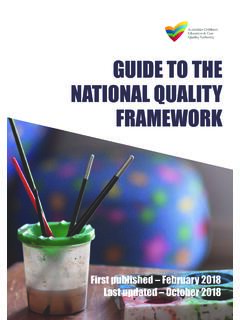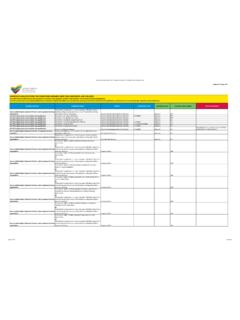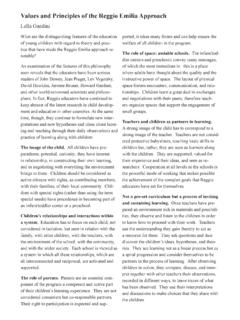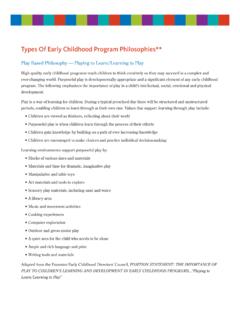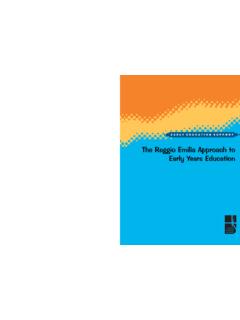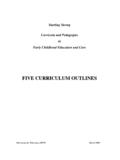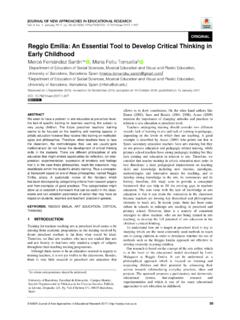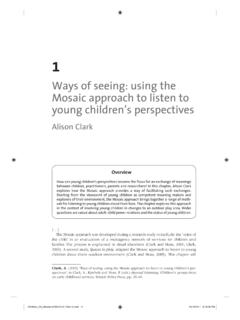Transcription of Collaborating with Children for Effective Programming
1 Community Child Care Victoria 2011 - 1 - Collaborating with Children for Effective Programming Self-Guided Learning Package This resource was developed by Community Child Care (CCC) with funding provided by the Australian Government Department of Education, Employment and Workplace Relations under the Inclusion and Professional Support Program (2008-12). The Inclusion and Professional Support Program is funded by the Australian Government Department of Education, Employment and Workplace Relations. Community Child Care Victoria 2011 - 2 - About Self-Guided Learning Packages Self-Guided Learning Packages can be completed in your own time and convenience and offer an alternative to attending training sessions.
2 This package aims to develop skills and knowledge that will be valuable to you in providing quality education and care programs. Packages are often used for professional development by staff teams, networks and other groups of Children s services professionals. You can work through the package with colleagues by reading the package together, discussing the information and Collaborating to complete the one assessment task. Gowrie Victoria Leadership and Learning Consultants are available to support you while working through the package. Feel free to phone or email if you require any assistance completing the tasks within the package. Phone 1800 103 670 (freecall) or (03) 9347 6388 or email Community Child Care Victoria 2011 - 3 - Collaborating with Children for Effective Programming You have chosen to complete the Collaborating with Children for Effective Programming package.
3 The aim of this package is for the learner to develop an understanding of the importance of Collaborating with Children for Effective Programming . It will also assist the learner to consider the value of collaboration and plan a range of strategies to collaborate with Children in aspects of the program. The learner will also explore collaborative approaches to planning and reflect on ways to use these ideas in practice. A high quality early childhood program involves the collaboration of Children , families and educators in planning and developing meaningful learning experiences. When Children actively contribute to the program, they are more likely to be engaged in play that responds to their interests, abilities and strengths.
4 Authentic curriculum requires educators to find out about Children s worlds. Strong and authentic partnerships between educators and families provide many opportunities for educators to find ways to connect to Children s worlds and incorporate them into the early childhood curriculum. Children are then able to utilise their expertise and investigate their passions, resulting in authentic and dynamic curriculum opportunities (Arthur et al, 2003, p9). Collaboration with Children means consulting with Children in ways that are developmentally appropriate and meaningful to the child. It also requires adults to provide Children with opportunities to express their views and be genuinely listened to by caring, responsive adults.
5 Educators working in early childhood settings need to ensure they provide Children with many opportunities to express their ideas and views in ways that are meaningful to Children . This view enables Children to be active participants in the planning of authentic and relevant curriculum. Self Help Question 1 What does collaboration mean to you? What is collaboration? The Oxford Dictionary of English (2003) defines collaboration as: the action of working with someone to produce something (p338). Collaboration has also been described by a number of early childhood researchers to reflect the nature of meaningful work that is undertaken by Children and adults or Children and their peers.
6 Stonehouse and Gonzalez-Mena (2004) describe the following aspects as being vital to Effective collaboration with Children . Interactions and relationships have priority Diversity and individuality are honoured Children are viewed as partners. Community Child Care Victoria 2011 - 4 - Self Help Question 2 In what ways does the Early Years Learning Framework encourage us to collaborate with Children ? What characterises genuine collaboration? Stonehouse and Gonzalez-Mena (2004) suggest the following criteria are critical to genuine collaboration and partnerships: Mutual respect Trust Sensitivity to the other s perspective Ongoing, open communication Recognition and valuing of the unique contribution and strengths of the partner Shared decision making.
7 Self Help Question 3 Describe a situation in which you have collaborated with a child or another adult in your service. The Early Years Learning Framework The EYLF (2009, p11) refers to pedagogy as the holistic nature of early childhood educators professional practice (especially those aspects that involve building and nurturing relationships), curriculum decision-making, teaching and learning. When educators establish respectful and caring relationships with Children and families, they are able to work together to construct curriculum and learning experiences relevant to Children in their local context. These experiences gradually expand Children s knowledge and understanding of the world.
8 Educators professional judgments are central to their active role in facilitating Children s learning. In making professional judgments, they weave together their: professional knowledge and skills knowledge of Children , families and communities awareness of how their beliefs and values impact on Children s learning personal styles and past experiences (EYLF, 2009, p11). Community Child Care Victoria 2011 - 5 - They also draw on their creativity, intuition and imagination to help them improvise and adjust their practice to suit the time, place and context of learning. Different theories about early childhood inform approaches to Children s learning and development.
9 Early childhood educators draw upon a range of perspectives in their work which may include: developmental theories that focus on describing and understanding the processes of change in Children s learning and development over time socio-cultural theories that emphasise the central role that families and cultural groups play in Children s learning and the importance of respectful relationships and provide insight into social and cultural contexts of learning and development socio-behaviourist theories that focus on the role of experiences in shaping Children s behaviour critical theories that invite early childhood educators to challenge assumptions about curriculum.
10 And consider how their decisions may affect Children differently post-structuralist theories that offer insights into issues of power, equity and social justice in early childhood settings. Drawing on a range of perspectives and theories can challenge traditional ways of seeing Children , teaching and learning, and encourage educators, as individuals and with colleagues, to: investigate why they act in the ways that they do discuss and debate theories to identify strengths and limitations recognise how the theories and beliefs that they use to make sense of their work enable but also limit their actions and thoughts consider the consequences of their actions for Children s experiences find new ways of working fairly and justly (EYLF, 2009, p11).



